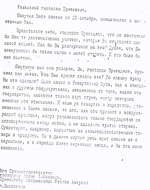3D Cuban Missile Crisis
Wes Cowan of PBS's History Detectives learns about the role of aerial reconnaissance and aerial photography in the Cuban Missile Crisis.
Wes Cowan of PBS's History Detectives learns about the role of aerial reconnaissance and aerial photography in the Cuban Missile Crisis.
Professor Larry Schweikart argues that most popular textbooks today show a liberal, left-wing bias. He reexamines specific periods in U.S. history from a conservative perspective, focusing particularly on the slave market within the U.S. and then on Ronald Reagan's presidency and his role in ending the Cold War.
This lecture continues from A Patriot's History of the United States, Part One: Liberty and Property in the American Past.
Professor Larry Schweikart argues that most popular textbooks today show a liberal, left-wing bias. He reexamines specific periods in U.S. history from a conservative perspective, focusing on Ronald Reagan's presidency and the colonization of the original colonies, particularly as documents from the latter discuss property rights.
This lecture continues in A Patriot's History of the United States, Part Two: Reinterpreting Reagan and the Cold War.
Professor and author Noam Chomsky discusses the current "War on Terrorism" in the context of earlier perceptions of terrorism and national threat, including the Cold War and World War II.
The link provides direct access to the video, as no visual webpage exists as a gateway.

The Central Intelligence Agency (CIA) has digitized thousands of formerly secret documents declassified to comply with Freedom of Information Act requests.
Keyword search capabilities are provided for the complete site. In addition, there are eight collections designated as "frequently requested records" that total nearly 8,000 documents. These collections cover a number of Cold War topics: CIA involvement in the 1954 coup in Guatemala; convicted spies Ethel and Julius Rosenberg; the 1961 Bay of Pigs affair; and two well-known espionage incidents.
Additional topics include POW MIAs in Vietnam, human rights abuses in Latin America, and UFOs. A disclaimer notes that some material cannot be disclosed due to national security laws, and released pages often have material deleted or blacked out. Still, the material offered is voluminous and useful for studying Cold War foreign policy and military history.

One "showcase" within a multi-part exhibit that presents Soviet archival documents, this site offers three items related to Cold War politics and ideology: a 1945 telegram from Stalin to Harry Truman; a 1971 document from the Communist party's Central Committee, "Additional Measures To Expose Imperialist Policies"; and a 1962 telegram from Khrushchev to John Kennedy protesting American policy in Cuba.
The documents, available as both untranslated images and translated texts, are accompanied by a useful introduction of 1,036 words.
Visitors should consider using the site's "guided tour," which incorporates these materials within the larger exhibit.
Professors John Moser and Jeremi Suri look at Wilsonianism in foreign policy post-Vietnam, particularly in the presidency of Ronald Reagan. Moser and Suri also look at foreign policy in the present day.
To listen to this lecture, scroll to the Friday, July 16th, 10:50 am-12:20 pm session; and select either the RealAudio image or link in the gray bar to the left of the main body of text.
Professor Jeremi Suri considers the influence of Wilsonianism on foreign policy since the presidencies of both Wilson and Franklin D. Roosevelt. Suri looks at this foreign policy school's supporters both during the Cold War and after.
To listen to this lecture, scroll to the Friday, July 16th, 9:00 am-10:30 am session; and select either the RealAudio link or image in the gray bar to the left of the main body of text.
Professor Jeremi Suri discusses Henry Kissinger's foreign policy of detente. He looks at the effect Kissinger's policies had on Cold War diplomacy and how they affected the Cold War and the world as a whole, and also discusses the writing of academic books and articles.
To listen to this lecture, scroll down to the Wednesday, July 14th, 7:30-9:30 pm session. Then click on the Real Audio link in the gray bar to the left of the main text.